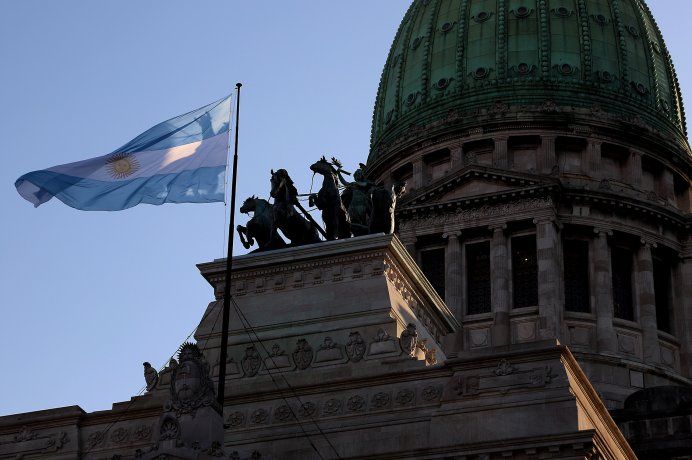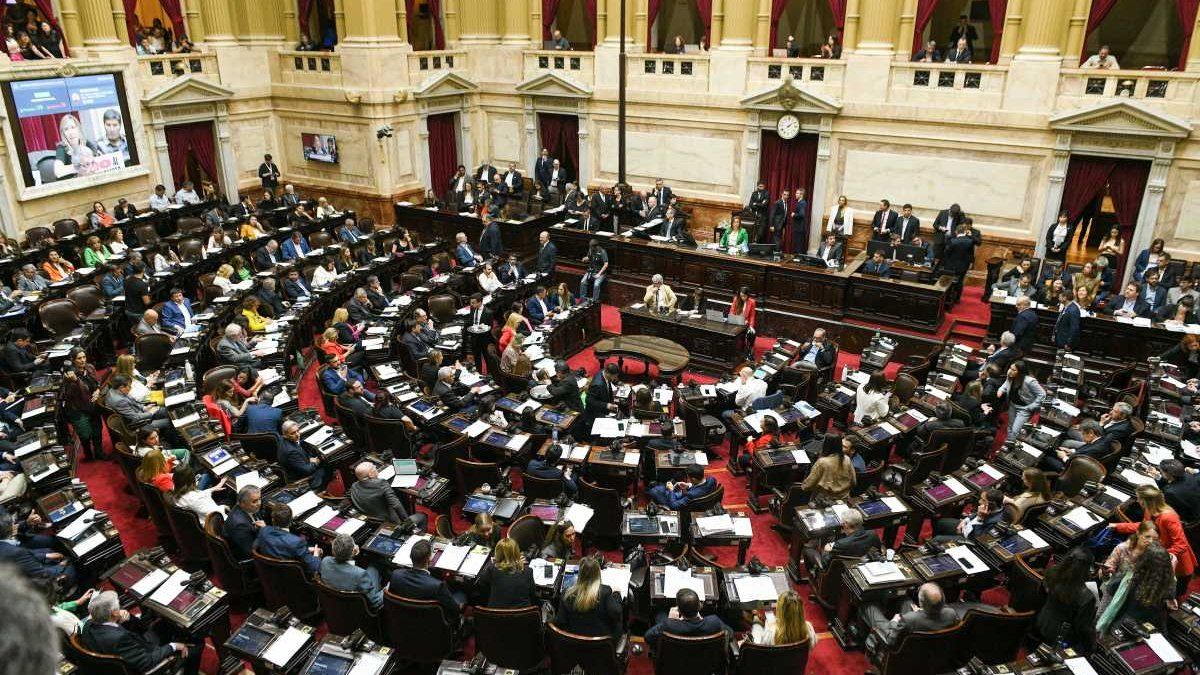budget 2023 deputies 1
telam
Where does the privilege of the Judiciary come from?
The Law No. 20,628, enacted in 1973is the one that currently regulates income tax (with its many modifications). In its original wording, it contemplated that male and female judges, members of the courts of account and national and provincial tax courts, as well as any judicial official with a salary equal to or greater than a judge of first instance, were exempt from paying the tax, an exemption that extended to retirement assets. In this original version, allowances for national legislators were also exempt from payment. In 1996, Congress passed Law No. 24,631 and repealed these exemptions.
Nowadays Legislators tax profitsbut the judicial authoritiesdespite the validity of the norm, kept the privilege. Law 24,631 was published in the Official Gazette at the end of March of that year, It entered into force at the beginning of April, and three days after its entry into force, the Supreme Court of Justice of the Nation issued Decision No. 20/96, which declared the repeal inapplicable.
The National Constitution establishes that the taxation corresponds to Congress. That is to say that, unlike judges and judges, the rest of people who want to be exempt from earnings need to file a court case To obtain the declaration of unconstitutionality of the norm that regulates the tax, defend their arguments and obtain a definitive sentence that proves them right, with the years of delay that this implies. Nevertheless, the judges gave themselves the last word on their own privileges, through the issuance of an agreement that violates legal and constitutional provisions. Among the arguments included in Agreement No. 20/96, the Court held that the payment of income tax violates the independence of the judiciaryand clarified that “the intangibility of the compensations assigned to judges for the exercise of their functions does not constitute a privilege but rather a guarantee to ensure the independence of the Judicial Power of the Nation.”
At the end of 2016, Congress reaffirmed the privilege of employees and officials of the Judiciary, incorporating into the legislation the exemption that had been established by Acordada, and extending it to magistrates and officials of the Public Prosecutor’s Office and Public Ministry of Defense. Thus, art. 5 of Law No. 27,346 modified the Income Tax Law and established that in the case of the magistrates, officials and employees of the Judicial Power of the Nation, provinces and the Public Ministry of the Nationearnings are those from the performance of public office only when their appointment would have occurred from the year 2017, inclusive.
What happened to privileges in Budget 2023?
The majority opinion issued by the Budget and Finance Commission of Deputies on the Budget Project 2023 ccontemplated the elimination of this exemption from next year but that change was not accepted by the majority in the room and judges who were appointed prior to 2017 will continue to retain the privilege of not paying earnings. The article eliminated in the enclosure established that with the collection, if it had been approved, the allocations of the Progresar Scholarship program and the National Teacher Incentive Fund and a program was going to be financed to combat insecurity in the city of Rosario. However, it was decided to continue to hold the privilege for a high income sector and consequently giving up resources that could be oriented to guarantee rights.
The injustice of this privilege is more evident when compared to the amounts of some direct expenses. By 2023, it is estimated that sustaining this exemption to the Judiciary will cost $237,850.2 million, which is equivalent to more than four times the budget for the items of School, Community and Picnic Canteens of the Ministry of Social Development or 4.3 budgets of the Ministry of Women, Gender and Diversity. That money would also be enough to finance the complete scheme for birth and adoption licenses provided for in the “Care in Equality” Bill, which is still waiting to be discussed in committees.
But this exemption is not the only one that has been maintained for years no review. They are also exempt from paying profits:
- mining companies
- People residing in the country with respect to income from the sale of shares and other securities listed on stock exchanges
- Lottery agency services and others operated by the State are exempt from VAT, and rural real estate and deposits in financial entities, or digital platforms, are exempt from personal property tax, even if they sell services in the country, among others mentioned. Alejandro Rebbosio in his note
For the total tax expenditures, by 2023 the Executive plans to stop collecting $3,664 billion, an amount equivalent to the budget of 4 Ministries (of Health, Social Development, Education and the Interior) and the Legislative and Judicial Powers together, or five times the investment in the Universal Child and Pregnancy Allowance (AUH and AUE).
The same Project that suggested the review of tax expenditures foresaw a reduction in primary spending (without interest on the debt), in a scenario of average inflation of 72.5% for 2022, of 4.3%, which is mainly explained due to the drop in economic subsidies, energy and transportation (-16%), and social programs (-12%). This contrasts with the increase in allocations for the payment of interest on the debt, which in addition to growing 15% in real terms, considerably increases its share of the total budget, according to the Congressional Budget Office. It is within the framework of the Government’s concern for the fulfillment of the goals with the IMF and the reduction of the public deficit that the proposal to review some tax benefits emerges.
tax expenses
These are differentiated tax treatment that apply to certain taxpayers for favor activities, areas, subjects and/or consumption, departing from the general tax legislation. What is striking is that, although they imply a transfer of public resources implemented through a tax reduction, its treatment is extremely opaque with respect to that of direct expenses such as food policies, school construction or energy subsidies. While direct spending can be monitored daily through the Open Budget sitetax expenditures do not even have annual information on the loss of resources they represented for the State.
The estimates that exist -those that indicate that they would reach, annually, 2.5 points of GDP- are those of the Budget Law and the triennial reports of tax expenditures. In both cases, they forecast how many resources it is estimated that the State will not receive, but no subsequent analysis is carried out on the resources that were effectively not collected.
Similarly, while direct spending programs have physical goals and performance indicators, tax expenditures remain for years without their impacts being evaluated. Just to give an example, in one of the reports published quarterly by the State, it is detailed that the Food benefits granted to March 2022 were 2.51 million and in the 2023 budget project it is proposed to reduce them to 2.43 million. Regarding tax expenditures, on the other hand, not only are their economic, social and environmental impacts unknown, but in many cases, not even the authorities that implement them have access to key information such as amounts and taxpayers or beneficiary sectors. Added to this is the fact that, while direct spending transfers are reviewed each year in the National Congress and are usually audited by internal and external control agencies, tax expenditures rarely have a termination clause or a deadline. determined for its validity.
To the above is added inequality in access to public information depending on the type of benefit in question. For his role in the tax collection, the AFIP is the only institution that intervenes in the application of all tax expenditures. Despite this, their interventions do not allow for control over the correct use of these benefits. Not only that, but, making an extremely restrictive application of tax secrecy, it refuses to provide information regarding its beneficiaries, failing to comply with court orders that order it to provide data on beneficiary individuals and companies – applying the jurisprudence of the Supreme Court of Justice of the Nation. in the “CIPPEC” case of 2014, where it ordered the personal data of those who receive transfers or social protection benefits to be made public.
Thus, there is the paradox that the data on the benefits that the State grants to the most vulnerable population are accessible to citizenswhile those granted to some of the wealthiest sectors of society remain hidden from anyone who wants to control them and, in some cases, even from the authorities in charge of their management.
Congress Senate Deputies

Mariano Fuchila
It is necessary and urgent for Congress to discuss which tax expenditures are justified and which should be eliminated. However, doing only this would leave the door open for new unjustified privileges to be incorporated in the future. Contrary to direct expenses, taxpayers lack a legal guideline that regulates procedures for their sanction, implementation and subsequent control. We need a regulation that establishes clear and rigorous procedures for the creation, execution and control of all tax expenditures that are approved from now on
Source: Ambito




